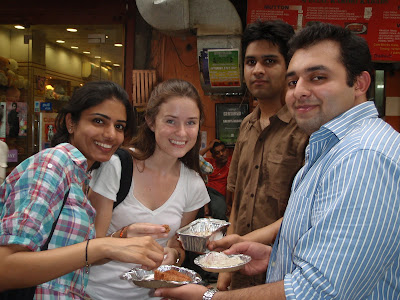So now I can reflect on our trip to Delhi and somehow describe it in words. This will be a challenge. I'd like to pick one word to describe India, but I have too many to choose from. The closest I can come is the word "excessive." But not with the negative connotation we naturally assume with that word. It's not a negative thing - it's invigorating.
All of your senses are engaged here, whether you like it or not:
Your eyes are overwhelmed by the brilliant colors everywhere around you - bright orange saris decorated with sequins, women with huge gold earrings and nose rings, bright purple turbans, houses that are painted neon pink and yellow, trucks on the highways with painted designs covering every inch...


Your sense of smell is assaulted by the sour smell of garbage...the exhaust from rickshaws, buses, cars...the raw smell of livestock - cows roaming the streets, donkeys, goats, and buffalo...then your nose is delighted by the scent of jasmine flowers sold on the streets, dropped into your hands at temples, and decorating women's hair. My favorite smell, though, is rose. Rivaling the popularity of jasmine, rose water, rose soap, and rose petals are found everywhere.


Your ears are overwhelmed by the incessant honking on the streets and highways - instead of turn signals, cars honk to signal their intentions. Trucks and buses have the most interesting yet obnoxious horns I've ever heard - usually three or four different notes played in some sequence as opposed to just one tone. When cars are backing up, instead of the beeping we're used to with trucks in the USA, they instead play a melody. Your ears are still overwhelmed by the constant music coming from all corners. Everything from car radios to a lone man on his bike singing a Bollywood song to himself.

Your sense of taste is perhaps the happiest of the senses here. Though it takes a little getting used to. I never thought I'd see a day where a plate of onions is served with breakfast - and I happily add them to my plate. Raw onions?? But they're SO good. Spice for breakfast, spice for lunch, spice for dinner.

Lastly, the sense of touch. In Delhi there is 85% humidity. You step outside and your clothes stick to you. Something lightly tickles your skin and it's either a drop of sweat rolling down your skin or a fly crawling on you. I guess it could be a variety of other insects, but I won't go there. Then there are the itchy mosquito bites - can't forget those. But then there's my favorite sense of touch which is what you feel with the bottoms of your feet. You must take off your shoes in India more times than you can count - temples, mosques, people's houses, etc. But by far, my favorite time I took off my shoes was at the Bangla Sahib Gurudwara in Delhi. We took off our shoes and then there was a shallow canal of sorts that was at the base of the stairway leading up to the Gurudwara. We all had to walk through the water to cleanse our feet before climbing the stairs. I've written about this feeling before in earlier blog posts - but there's something about being barefoot with everyone else that instantly grounds you and connects you to those around you.

It's been a while since I was in elementary school studying the five sense, but where do emotions come? Sense of "touch" there? Like homesickness, loneliness, happiness, gratefulness...? In the interest of not being "excessive", I'll save that for another blog post.





